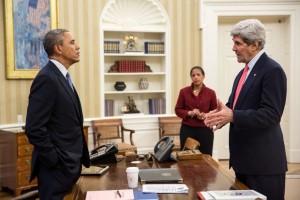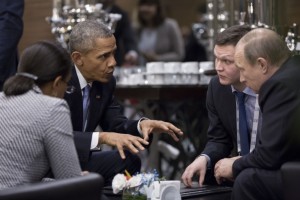
Gilbert Doctorow, Ph.D.
Gilbert Doctorow is the European Coordinator of the American Committee for East West Accord, Ltd. Gilbert Doctorow is a Research Fellow of the American University in Moscow
The Obama administration is dangling the possibility of real peace progress in Ukraine to convince the Europeans to renew sanctions on Russia, but is that just a bait-and-switch trick to keep Europe in line, asks Gilbert Doctorow.
The ongoing information war between Russia and the U.S.-led West creates moments that are paradoxical if not downright confusing. But confusion may be the prime objective of both sides, following the old maxim: if you cannot convince, confuse. But confusion can be dangerous, too.
This week, National Security Adviser Susan Rice expressed hope that the Ukraine crisis could be resolved by the time President Barack Obama leaves office on Jan. 20, 2017, citing redoubled efforts by U.S., French and German officials to complete implementation of the Minsk-2 agreement signed in February 2015.

President Barack Obama talks with Secretary of State John Kerry and National Security Advisor Susan E. Rice in the Oval Office on March 19, 2014. (Official White House Photo by Pete Souza)
"This is something that could get done between now and the end of the administration if the Russians in particular exhibit sufficient political will,” Rice said at a Washington Post event. "We are hopeful if the Russians want to resolve this – and we have some reason to believe they might – we have the time and the wherewithal and the tools to do so.”
Though Rice’s comments got scant attention in the U.S. news media, Russians picked them up presumably because they offer hope of an end to anti-Russian sanctions before the end of Obama’s term. But was Rice serious or was she just dangling some false optimism to ensure that the European Union doesn’t disrupt this supposed peace progress by failing to renew sanctions against Russia that are otherwise set to expire at the end of June?
The timing for this optimistic prediction from one of Obama’s closest advisers on security matters was well chosen to influence opinions within the E.U. in the next couple of weeks when the 28 Member States take a decision whether or not to extend the present sanctions for another six months.
After all, the thinking would go, if the pressure on Russia has brought the Kremlin to the point of implementing fully the Minsk-2 terms, why let up. Rice’s overture seems especially designed to shut up Hungary, Italy and most recently France, countries that have raised their voices in recent weeks. These waverers have suggested that the sanctions deserve an open discussion now and that some softening should be implemented without delay.
The underlying assumption in Rice’s statement is that Washington can break the deadlock on the Ukrainian side that has held up progress on implementation of Minsk-2, namely the passage through the Rada (Ukraine’s parliament) of laws for holding elections in the breakaway republics of the Donbass expected in July. However, given the present configuration of power in Kiev, nationalist radicals are in a position to block any meaningful concessions.
Russia’s Wishful Thinking
Meanwhile, the wavering within Europe has been wildly exaggerated, partly with the help of the self-deluding Russian media which gave intensive coverage to the near unanimous vote earlier this week by the French Senate to soften sanctions, thereby putting both houses of the French legislature on record as opposing the policy of President Francois Hollande and the E.U. leadership to punish Russia over Ukraine. By contrast, French major media largely overlooked the vote in its own Senate.

President Barack Obama meets with President Vladimir Putin of Russia on the sidelines of the G20 Summit at Regnum Carya Resort in Antalya, Turkey, Sunday, Nov. 15, 2015. National Security Advisor Susan E. Rice listens at left. (Official White House Photo by Pete Souza)
These alternative interpretations of what’s important and what isn’t also influence the people of both Russia and the West. This pattern of contradictory emphasis is not propaganda in the classic sense, but it has the effect of muddling minds and contributing to the misreading by one side of the other.
That, in turn, can contribute to very real dangers. The West insists that NATO’s war games, code-named Anaconda, very close to Russia’s borders are simply intended to deter "Russian aggression.” But these largest maneuvers since the Cold War are rehearsing, we are told, the capture of Russia’s Kaliningrad enclave.
So, Moscow sees the West threatening Russia by expanding NATO right up to Russia’s border, placing anti-ballistic missiles in Romania, and orchestrating the 2014 coup in Ukraine that installed a virulently anti-Russian regime.
This divergence of opinion about who’s threatening whom creates genuine – not just theoretical – danger. And the last thing we need at this moment is muddled minds.



.jpg/250px-ElbeDay1945_(NARA_ww2-121).jpg)





